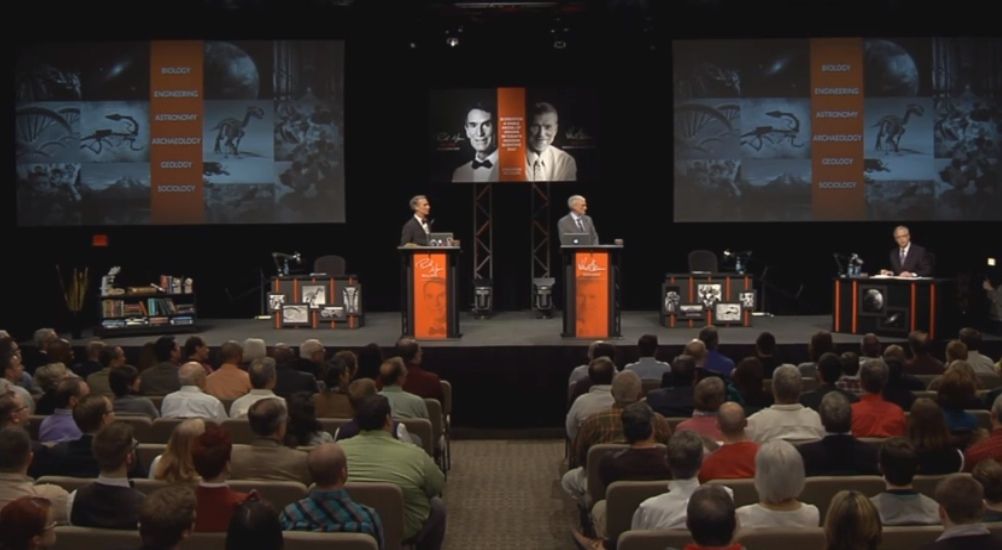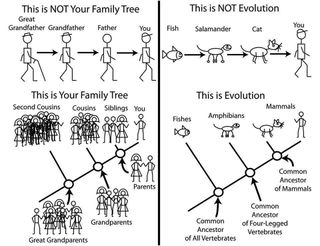Bill Nye's Creationism Debate Not a Total Disaster, Scientists Say

The debate between science popularizer Bill Nye and creationist Ken Ham last night (Feb. 4) was controversial before it even began. Scientists from across disciplines argued that debating young-Earth creationism legitimizes the idea, which holds that the Bible's Book of Genesis is a literal description of the creation of the world 6,000 years ago.
Scientists and science educators also worried that Nye would be backed into a corner by a barrage of nonsensical misrepresentations of scientific evidence, impossible to refute without teaching the audience Science 101. The morning after, watchers seemed to agree that such a slaughter had not come to pass, though they still questioned the point of the creationism debate and the detailed approach taken, which included a scripted introduction and presentation by each speaker followed by a more traditional debate.
"Success, as much as there could be in this situation, came when the scripted part was over and Nye put his heart, soul and guts into his direct reactions to Ham's," said Holly Dunsworth, an anthropologist at the University of Rhode Island. "Before that, it just looked like two men throwing as much stuff at the audience as they could." [Creationism vs. Evolution: 6 Big Battles]
Debating science
Should Bill Nye have agreed to debate creationist Ken Ham?
Ham, founder of Kentucky's Creation Museum, rejects large swaths of scientific knowledge, because of his belief that Genesis should be interpreted literally. He also, as he made clear during the 2.5-hour-long debate at the Museum, rejects much of the scientific process. Ham divides science into "observation science," the discoveries that work in the present and make modern technology possible, and "historical science," which encompasses any attempt to look into the past. Ham is alone in making this distinction, which scientific researchers find baffling.
"What happened a minute ago is due to the same laws that cause what will happen a minute from now," Dunsworth told Live Science. "Everyone takes this for granted, even creationists, otherwise they'd be afraid to step outside the house every morning, wondering whether the ground would give way or whether they'd fall up into outer space."
Sign up for the Live Science daily newsletter now
Get the world’s most fascinating discoveries delivered straight to your inbox.
Nye combated Ham's argument with a barrage of evidence of a planet far older than 6,000 years (in fact, Earth is about 4.5 billion years old), including ice cores that hold a record of hundreds of thousands of summer-winter cycles, fossils dating back millions of years, tree rings showing at least 9,000 years of history and cosmic microwave background radiation that holds evidence of the Big Bang, but failed to get much of an explanation for why Ham disregards this evidence.
"[Ham's] explanation was 'Well, nobody was there to observe this,'" said climatologist Michael Mann of Pennsylvania State University. "In other words, if humans weren't there to observe it, it didn't happen. That's not science."
Strange citations
Ham also spent time citing mainstream scientific studies he said backed up his worldview. In one example, he cited research that came out in January 2014 about dog domestication, arguing that the study's finding that modern dogs evolved from a single population of wolves backs up his idea that God created "kinds" of animals that diverged into today's species within a few thousand years. Ham believes that "kinds" cannot diverge into other "kinds." For example, a branch of dinosaurs could never have evolved into today's birds.

"The interpretation he presented is difficult to understand from our perspective," John Novembre, the lead author of that study, told Live Science. Dogs clearly diverged from wolves recently, as shown by their DNA similarity, Novembre said; the existence of evolution makes exploring the relationship possible.
"As genome-scale sequences have finally become available to us, it's been amazing to see how a single theoretical framework can predict so many patterns seen in these massive datasets," Novembre said. (So evolutionary theory predicted what is now seen in genomes.)
However, these kinds of in-the-weeds examples likely only confused the audience, researchers said.
"I think that it was somewhat unfortunate that both speakers went into very many details, in a wide range of disciplines, instead of concentrating on a few basic points that fully capture the differences between the two views," said Mario Livio, an astrophysicist at the Space Telescope Science Institute in Baltimore, Md., and author of "Brilliant Blunders" (Simon & Schuster, May 14, 2013).
Success for science?
One of the key features of a scientific theory is that it is falsifiable, Livio told Live Science. That means the theory makes predictions that are testable in new experiments.
"As long as the results of those new experiments or observations agree with the predictions, the theories hold," Livio said. "Once the results are found to deviate from the predictions, the theory has to either be rejected or to be modified."
Creationism has no such predictable power, as findings must conform to the creationist's interpretation of God's word. [Top 10 Intelligent Designs (or Creation Myths)]
As a result, the debaters were "playing a game without consistent rules," Seth Shostak, an astronomer at the SETI Institute who watched the debate, wrote in an email to Live Science. Because Ham doesn't accept the basic premise of science, Shostak said, he shrugged off all of Nye's examples of scientific evidence for an old Earth and evolution.
Whether the debate was worthwhile is an open question. Some scientists, like Mann (who is friends with Nye), said their feelings were mixed but hoped a few "fence straddlers" were won over to a better understanding of evolution. Others felt the debate was a waste of time.
"This was not productive or beneficial to science education — it was a spectacle, pure and simple," said Matthew Bonnan, a paleontologist at the Richard Stockton College of New Jersey who blogs at The Evolving Paleontologist.
"There is a fear among many Americans that if they accept science, and evolution in particular, they have to abandon their faith," Bonnan said. "But science and faith are different things, which are not diametrically opposed to each other."
Debate may not change many minds, Shostak said, but Nye was right to hold the line — and to appeal to the need for an educated populace.
"I would merely say that the facts can speak for themselves, and with an elegance and brilliance that no resort to misguided faith can match," Shostak said. "We can try to learn quantum mechanics in the lab, or we can try to figure it out from biblical texts. But even wet-behind-the-ears students can appreciate that a cellphone became possible only when we took the former approach."
Josh Rosenau, a public information project director at the National Center for Science Education, helped Nye prepare for the debate and felt he came away as the winner.
"In the end, I'm just glad that it went so well," Rosenau told Live Science. "Hopefully we won't have another of these debates for a good long time."
Follow Stephanie Pappas on Twitter and Google+. Follow us @livescience, Facebook & Google+. Original article on Live Science.

Stephanie Pappas is a contributing writer for Live Science, covering topics ranging from geoscience to archaeology to the human brain and behavior. She was previously a senior writer for Live Science but is now a freelancer based in Denver, Colorado, and regularly contributes to Scientific American and The Monitor, the monthly magazine of the American Psychological Association. Stephanie received a bachelor's degree in psychology from the University of South Carolina and a graduate certificate in science communication from the University of California, Santa Cruz.